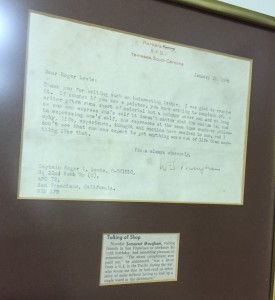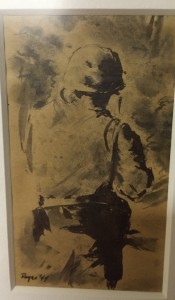Near the end of World War II, Roger K. Lewis, a captain in the Army Air forces, was stationed in the Philippines as a public relations officer. He had just finished reading The Razor’s Edge by Somerset Maugham and wanted to tell the writer how impressed he was with the book. And having been a combat artist, he shared some of his thoughts about being an artist. He mailed it off to Maugham’s publisher (Doubleday), not knowing whether it would be forwarded to Maugham, or whether he would get a reply.
 Several weeks later, Lewis received a typewritten letter.
Several weeks later, Lewis received a typewritten letter.
Thank you for writing such an interesting letter. I was glad to receive it.
Of course, if you are a painter, you have nothing to complain of. A writer
often runs short of material but a painter never can and as long as one can
express one’s self it doesn’t matter what the medium is, and in expressing
one’s self, one expresses at the same time whatever philosophy, life, experience,
thought and emotions have evolved in one, and I don’t see that one can expect to get
anything more out of life than something like that.
Yours always sincerely,
Somerset Maugham
Four years later, Lewis spotted a short item in an issue of Time magazine. It read: “Novelist Somerset Maugham, visiting friends in San Francisco…had something pleasant to remember. ‘The nicest compliment ever paid me’ he announced, ‘was a letter from a GI in the Pacific during the war, who wrote me that he had read an entire story of mine without having to look up a single word in the dictionary.’”
“I’m sure he was referring to my letter,” Lewis said. He framed his letter and the Time article, and despite Maugham’s wishes that his letters be destroyed, Lewis passed it on to Boatwright Library in 1997. It hangs in the Galvin Rare Book Room along with one of Lewis’s combat sketches.
